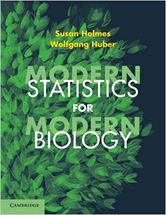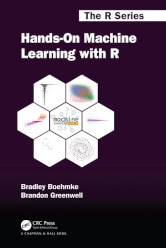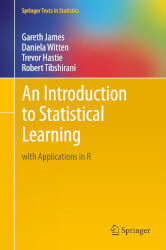26. Modern Statistics for Modern Biology by Susan Holmes & Wolfgang Huber
 Modern Statistics for Modern Biology is targeted at biologists wanting to learn powerful methods of modern computational statistics.
Modern Statistics for Modern Biology is targeted at biologists wanting to learn powerful methods of modern computational statistics.
It teaches you how to take raw data and turn it into informative and alluring output by learning how to write R scripts and to use advanced statistical packages from CRAN and Bioconductors.
The book covers a broad range of basic and advanced topics important in the analysis of high-throughput biological data, including principal component analysis and multidimensional scaling, clustering, multiple testing, unsupervised and supervised learning, resampling, the pitfalls of experimental design, and power simulations using Monte Carlo.
27. Hands-On Machine Learning with R by Bradley Boehmke and Brandon Greenwell
 This book provides hands-on modules for many of the most common machine learning methods to include:
This book provides hands-on modules for many of the most common machine learning methods to include:
- Generalized low rank models
- Clustering algorithms
- Autoencoders
- Regularized models
- Random forests
- Gradient boosting machines
- Deep neural networks
- Stacking / super learners
- and more!
28. Report Writing for Data Science in R by Roger D. Peng
 This book teaches the concepts and tools behind reporting modern data analyses in a reproducible manner.
This book teaches the concepts and tools behind reporting modern data analyses in a reproducible manner.
Reproducibility is the idea that data analyses should be published or made available with their data and software code so that others may verify the findings and build upon them.
The book has a suggested price of $10 but can be downloaded for free.
29. An Introduction to Statistical Learning with Applications in R by Gareth James, Daniela Witten, Trevor Hastie and Robert Tibshirani
 This book provides an introduction to statistical learning methods.
This book provides an introduction to statistical learning methods.
It is aimed for upper level undergraduate students, masters students and Ph.D. students in the non-mathematical sciences.
The book also contains a number of R labs with detailed explanations on how to implement the various methods in real life settings, and should be a valuable resource for a practicing data scientist.
Other useful books include:
30. Introduction to Statistical Thinking (With R, Without Calculus) by Benjamin Yakir
Introduction to Statistical Thinking is designed for college students who are required to learn statistics, students with little background in mathematics and often no motivation to learn more.
The first part of the book deals with descriptive statistics and provides probability concepts that are required for the interpretation of statistical inference. Statistical inference is the subject of the second part of the book.
Next page: Page 7 – A Little Book of R for Biomedical Statistics and more books
Pages in this article:
Page 1 – R for Data Science and more books
Page 2 – R Graphics Cookbook and more books
Page 3 – Fundamentals of Data Visualization and more books
Page 4 – Data Analysis for the Life Sciences and more books
Page 5 – An Introduction To R and more books
Page 6 – Modern Statistics for Modern Biology and more books
Page 7 – A Little Book of R for Biomedical Statistics and more books
All books in this series:
| Free Programming Books | |
|---|---|
| Ada | ALGOL-like programming language, extended from Pascal and other languages |
| Agda | Dependently typed functional language based on intuitionistic Type Theory |
| Arduino | Inexpensive, flexible, open source microcontroller platform |
| Assembly | As close to writing machine code without writing in pure hexadecimal |
| Awk | Versatile language designed for pattern scanning and processing language |
| Bash | Shell and command language; popular both as a shell and a scripting language |
| BASIC | Beginner’s All-purpose Symbolic Instruction Code |
| C | General-purpose, procedural, portable, high-level language |
| C++ | General-purpose, portable, free-form, multi-paradigm language |
| C# | Combines the power and flexibility of C++ with the simplicity of Visual Basic |
| Clojure | Dialect of the Lisp programming language |
| ClojureScript | Compiler for Clojure that targets JavaScript |
| COBOL | Common Business-Oriented Language |
| CoffeeScript | Transcompiles into JavaScript inspired by Ruby, Python and Haskell |
| Coq | Dependently typed language similar to Agda, Idris, F* and others |
| Crystal | General-purpose, concurrent, multi-paradigm, object-oriented language |
| CSS | CSS (Cascading Style Sheets) specifies a web page’s appearance |
| D | General-purpose systems programming language with a C-like syntax |
| Dart | Client-optimized language for fast apps on multiple platforms |
| Dylan | Multi-paradigm language supporting functional and object-oriented coding |
| ECMAScript | Best known as the language embedded in web browsers |
| Eiffel | Object-oriented language designed by Bertrand Meyer |
| Elixir | Relatively new functional language running on the Erlang virtual machine |
| Erlang | General-purpose, concurrent, declarative, functional language |
| F# | Uses functional, imperative, and object-oriented programming methods |
| Factor | Dynamic stack-based programming language |
| Forth | Imperative stack-based programming language |
| Fortran | The first high-level language, using the first compiler |
| Go | Compiled, statically typed programming language |
| Groovy | Powerful, optionally typed and dynamic language |
| Haskell | Standardized, general-purpose, polymorphically, statically typed language |
| HTML | HyperText Markup Language |
| Icon | Wide variety of features for processing and presenting symbolic data |
| J | Array programming language based primarily on APL |
| Java | General-purpose, concurrent, class-based, object-oriented, high-level language |
| JavaScript | Interpreted, prototype-based, scripting language |
| Julia | High-level, high-performance language for technical computing |
| Kotlin | More modern version of Java |
| LabVIEW | Designed to enable domain experts to build power systems quickly |
| LaTeX | Professional document preparation system and document markup language |
| Lisp | Unique features - excellent to study programming constructs |
| Logo | Dialect of Lisp that features interactivity, modularity, extensibility |
| Lua | Designed as an embeddable scripting language |
| Markdown | Plain text formatting syntax designed to be easy-to-read and easy-to-write |
| Objective-C | Object-oriented language that adds Smalltalk-style messaging to C |
| OCaml | The main implementation of the Caml language |
| Pascal | Imperative and procedural language designed in the late 1960s |
| Perl | High-level, general-purpose, interpreted, scripting, dynamic language |
| PHP | PHP has been at the helm of the web for many years |
| PostScript | Interpreted, stack-based and Turing complete language |
| Prolog | A general purpose, declarative, logic programming language |
| PureScript | Small strongly, statically typed language compiling to JavaScript |
| Python | General-purpose, structured, powerful language |
| QML | Hierarchical declarative language for user interface layout - JSON-like syntax |
| R | De facto standard among statisticians and data analysts |
| Racket | General-purpose, object-oriented, multi-paradigm, functional language |
| Raku | Member of the Perl family of programming languages |
| Ruby | General purpose, scripting, structured, flexible, fully object-oriented language |
| Rust | Ideal for systems, embedded, and other performance critical code |
| Scala | Modern, object-functional, multi-paradigm, Java-based language |
| Scheme | A general-purpose, functional language descended from Lisp and Algol |
| Scratch | Visual programming language designed for 8-16 year-old children |
| SQL | Access and manipulate data held in a relational database management system |
| Standard ML | General-purpose functional language characterized as "Lisp with types" |
| Swift | Powerful and intuitive general-purpose programming language |
| Tcl | Dynamic language based on concepts of Lisp, C, and Unix shells |
| TeX | Markup and programming language - create professional quality typeset text |
| TypeScript | Strict syntactical superset of JavaScript adding optional static typing |
| Vala | Object-oriented language, syntactically similar to C# |
| VHDL | Hardware description language used in electronic design automation |
| VimL | Powerful scripting language of the Vim editor |
| XML | Rules for defining semantic tags describing structure ad meaning |
